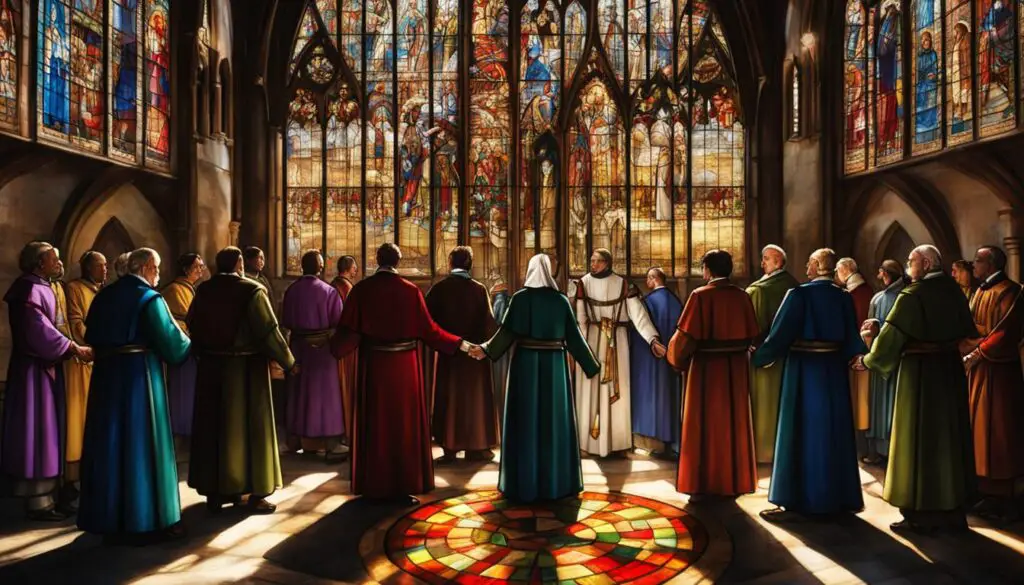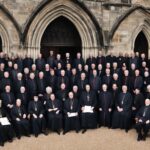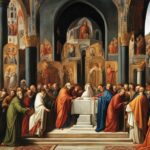Christian denominations encompass a wide range of beliefs, practices, and histories. This guide will provide a comprehensive overview of the three major branches of the Christian church – Eastern Orthodox, Roman Catholic, and the Protestant tradition – as well as the Anglican Communion. Each denomination has its own unique characteristics and contributions to the overall diversity of Christianity.
Key Takeaways:
- Christian denominations are diverse, with distinct beliefs and practices.
- The major branches of Christianity include Eastern Orthodox, Roman Catholic, Protestant, and the Anglican Communion.
- Understanding the differences between denominations enriches our knowledge of the Christian faith.
- Despite theological variations, all Christian denominations share a belief in Jesus Christ as Lord and Savior.
- Embracing diversity within Christianity fosters a deeper understanding of the faith.
The Eastern Orthodox Church
The Eastern Orthodox Church is one of the major branches of Christianity, with its own distinctive practices and traditions. Also known as Greek Orthodox, Russian Orthodox, or Antiochian Orthodox, the Eastern Orthodox Church has a rich history and a strong emphasis on liturgical worship.
One of the defining characteristics of the Eastern Orthodox Church is its use of icons. Icons are religious images that serve as windows into the divine and are venerated as a means of connecting with God. The use of icons in worship is deeply rooted in the Eastern Orthodox tradition and creates a visually engaging and spiritually meaningful worship experience.
Another important aspect of Eastern Orthodox worship is the practice of praying to saints. Saints are seen as intercessors who can offer prayers on behalf of the faithful. This practice highlights the belief in the communion of saints and the interconnectedness of the entire body of Christ.
“The Eastern Orthodox Church places a high priority on liturgical worship, with a focus on icons, praying to saints, and a worship service that engages all the senses.”
Key Doctrinal Emphases
- Tradition: The Eastern Orthodox Church places a strong emphasis on the preservation of ancient traditions and the teachings of the early Church fathers.
- Inclusion of Intertestamental Books: Unlike other Christian denominations, the Eastern Orthodox Church includes additional books in their canon, known as the Deuterocanonical or intertestamental books.
- Celibacy for Bishops: The Eastern Orthodox Church maintains the practice of celibacy for bishops, reflecting their dedication to a life of spiritual devotion and service.
- Theosis: The ultimate goal of salvation in the Eastern Orthodox Church is theosis, which refers to the process of becoming one with God and attaining divine likeness.
The Eastern Orthodox Church is a vibrant and diverse tradition within Christianity, adding to the overall richness of the Christian faith. Its distinctive worship practices and doctrinal emphases contribute to a unique spiritual experience for its followers.
The Roman Catholic Church
The Roman Catholic Church, also known as the Catholic Church, is one of the major branches of Christianity. With a rich history spanning centuries, the Roman Catholic Church has had a significant influence on religious, cultural, and social aspects of society.
This denomination places a strong emphasis on liturgical worship, which includes rituals, sacraments, and the participation of the congregation. At the center of Catholic worship is the celebration of the Eucharist, where believers partake in the body and blood of Christ. This practice is based on the doctrine of transubstantiation, which teaches that the bread and wine used in the sacrament become the actual body and blood of Christ.
One of the defining features of the Roman Catholic Church is its hierarchical structure, with the pope serving as the head of the church. The pope is believed to be the successor of Saint Peter, whom Jesus appointed as the leader of the early Christian community. The pope’s authority extends to matters of faith, doctrine, and the governance of the church.
In addition to its distinctive practices and hierarchy, the Roman Catholic Church holds to a set of core beliefs, including the belief in the Holy Trinity, the divinity and humanity of Jesus Christ, and the salvation through faith and works. The church also upholds the teachings of the Bible, as well as sacred tradition, which includes the writings of early church fathers and the decisions of ecumenical councils.

Table: Key Features of the Roman Catholic Church
| Beliefs | Practices | Structure |
|---|---|---|
| – Belief in the Holy Trinity | – Emphasis on liturgical worship | – Hierarchical structure with the pope as the head |
| – Divinity and humanity of Jesus Christ | – Celebration of the Eucharist as the central sacrament | – Bishops, priests, and deacons as ordained clergy |
| – Salvation through faith and works | – Practice of confession and penance | – Authority of ecumenical councils and the magisterium |
The Protestant Tradition
The Protestant tradition emerged during the Reformation in the 1500s as a response to perceived corruption and doctrinal differences within the Roman Catholic Church. Led by influential figures such as Martin Luther, John Calvin, and Ulrich Zwingli, Protestants sought to reform and reshape the practice and teachings of Christianity. Today, the Protestant tradition encompasses a wide range of denominations, each with its own unique beliefs, practices, and contributions to the overall diversity of Christianity.
One key aspect of the Protestant tradition is its emphasis on the authority of Scripture. The concept of “Sola Scriptura,” or “Scripture Alone,” holds that the Bible is the ultimate source of authority in matters of faith and practice. This focus on Scripture leads to a diversity of interpretations and theological perspectives within Protestant denominations.
Protestant denominations place a strong emphasis on individual faith and personal relationship with God. They believe that each individual is responsible for their own salvation and has direct access to God through prayer and the study of Scripture. This emphasis on personal piety and spiritual autonomy is a distinguishing characteristic of the Protestant tradition.
Protestant denominations also vary in their worship styles and sacramental practices. Some denominations, such as Baptists and Evangelicals, prioritize contemporary worship with a focus on music and preaching, while others, like Lutherans and Anglicans, value more traditional liturgical worship. The sacraments, such as baptism and the Lord’s Supper, hold different significance and practices among Protestant denominations.
Key Protestant Denominations
Within the Protestant tradition, there are several key denominations that have had a significant impact on the development of Christianity. These include:
- Methodists: Methodists emphasize the importance of Christian service and social justice as an integral part of their faith.
- Presbyterians: Presbyterians have a rich academic tradition and value intellectual inquiry in their pursuit of understanding God.
- Lutherans: Lutherans strive to create a sacred worship environment and place a strong emphasis on the sacraments and the presence of Christ in the Eucharist.
These denominations, along with numerous others within the Protestant tradition, contribute to the diversity and richness of Christianity as a whole.
Methodists: Emphasizing Christian Service
Methodists are known for their strong emphasis on service to others as an integral part of their faith. They believe that true faith in Jesus must be spiritually active through helping the poor and working for justice in the world. This commitment to social action stems from the belief that faith should not simply be a personal endeavor, but should manifest through acts of love and compassion towards others.
Methodists have a long history of involvement in various charitable and humanitarian initiatives. They actively engage in community service projects, providing assistance to those in need, and advocating for social justice issues such as poverty alleviation, healthcare access, and human rights. Methodists believe that these acts of service are not only a reflection of their faith, but also a means of expressing God’s love and transforming society.
“Faith by itself, if it is not accompanied by action, is dead.” – James 2:17
Methodists and Christian Service
Methodists place a strong emphasis on practical expressions of their faith through Christian service. Their commitment to service aligns with their belief in the essential connection between faith and action. By engaging in acts of service, Methodists seek to follow the example of Jesus Christ, who taught and demonstrated the importance of loving one’s neighbor and caring for the marginalized and oppressed.
To illustrate the impact of Methodist Christian service, below is a table showcasing some of the key areas in which Methodists actively contribute to society:
| Areas of Methodist Christian Service | Description |
|---|---|
| Community Outreach | Engaging in local initiatives to support the homeless, provide food and clothing, and assist vulnerable populations. |
| Global Missions | Participating in international projects that address poverty, education, healthcare, and disaster relief. |
| Advocacy | Working to promote social justice, equality, and the protection of human rights through legislative and policy advocacy. |
| Environmental Stewardship | Taking responsibility for the care and protection of the environment, advocating for sustainable practices, and supporting conservation efforts. |
Through their dedication to Christian service, Methodists strive to make a positive difference in the world and uphold the belief that faith should inspire actions that bring about meaningful change.
Presbyterians: Embracing an Academic Tradition

Presbyterians have a long-standing commitment to intellectual inquiry and education, making them an integral part of the academic tradition within Christianity. They emphasize the pursuit of knowledge and the exploration of God’s creation in various fields, including math, science, philosophy, and theology. This commitment to education has led to the establishment of prestigious universities and colleges, such as Princeton University, which was founded by Presbyterians in 1746.
The Presbyterian Church places a high value on critical thinking, encouraging its members to engage in thoughtful study and analysis of both religious and secular subjects. Through their academic tradition, Presbyterians seek to cultivate a well-rounded understanding of the world and its complexities, recognizing that faith and reason can coexist harmoniously. This tradition enables them to contribute meaningfully to intellectual dialogue, bridging the gap between faith and academia.
Presbyterians believe that an informed faith is a strong faith, and they view education as a means to deepen their spiritual understanding. By engaging in academic pursuits, they seek to strengthen their relationship with God and better equip themselves to navigate the complexities of the modern world. This commitment to intellectual growth and exploration serves as a reminder that faith is not stagnant, but rather a living and evolving journey.
Lutherans: Embracing Sacred Worship
Lutherans are a branch of the Protestant tradition that places a strong emphasis on sacred worship. For Lutherans, worship is seen as a time to encounter the divine and experience the presence of Christ. Reverence and reverence are key elements of Lutheran worship, with a focus on liturgical practices and sacraments.
One of the central aspects of Lutheran worship is the belief in the real presence of Christ in the Eucharist. Lutherans view the sacrament of Holy Communion as a sacred act of receiving the body and blood of Christ. This belief guides their worship and engenders a sense of awe and reverence during the service.
Additionally, Lutherans value the use of traditional liturgy and hymnody in their worship. The Lutheran liturgy follows a structured format, allowing for a sense of continuity and familiarity for worshippers. Hymns, both ancient and modern, are an integral part of Lutheran worship, with congregational singing playing a significant role in the service.
Lutheran worship centers not only on the individual but also on the community as a whole. It is a time for congregants to gather, unite in faith, and participate in the sacraments together. Through sacred worship, Lutherans seek to deepen their connection with God and grow in their faith.
| Key Features of Lutheran Worship | Benefits |
|---|---|
| Real presence of Christ in the Eucharist | Encounter the divine and experience spiritual nourishment |
| Structured liturgy | Creates a sense of continuity and familiarity |
| Inclusive hymnody | Allows for congregational participation and collective worship |
Lutherans believe that through sacred worship, individuals and communities can grow in their understanding of God’s grace and the depth of their faith. It is a time to reflect, pray, and connect with the divine, fostering a sense of reverence and awe in the presence of God.

Anglican Communion
The Anglican Communion is a global network of autonomous churches that are in communion with the Archbishop of Canterbury. It is known for its combination of different Christian traditions, creating a diverse and inclusive church experience. Anglicans value both liturgical worship and personal devotion, with the Book of Common Prayer guiding their worship services.
Within the Anglican Communion, there is a range of theological beliefs and practices. This diversity is a reflection of the various perspectives and contributions within the larger Christian faith. Anglicans embrace differing views on various topics such as the ordination of women, same-sex marriage, and the interpretation of scripture.
Despite these differences, Anglicans are united by their commitment to the gospel of Jesus Christ and the belief in the sacraments. The Anglican Communion has a hierarchical polity, with the Archbishop of Canterbury as the senior bishop. The primates, who are the senior bishops of each province, gather regularly to discuss matters of common concern and foster unity.
Overall, the Anglican Communion strives to be a welcoming and inclusive community that encourages dialogue and respects the diverse perspectives within its member churches. It values the richness that comes from incorporating different traditions and expressions of faith, creating a vibrant and dynamic global communion.

Notable Anglican Communion Churches
| Church | Country | Membership |
|---|---|---|
| Church of England | United Kingdom | Approximately 25 million |
| Episcopal Church | United States | Approximately 1.7 million |
| Anglican Church of Canada | Canada | Approximately 0.6 million |
| Anglican Church of Australia | Australia | Approximately 3.1 million |
| Church of Ireland | Ireland | Approximately 375,000 |
The Diversity of Christian Denominations
Christian denominations contribute to the diverse tapestry of the Christian faith, offering unique perspectives and beliefs that enrich the overall understanding of Christianity. Each denomination brings its own distinct contributions to the table, creating a multifaceted expression of the Christian faith.
Within the broader Christian umbrella, denominations vary in their interpretations of scripture, worship practices, and theological emphases. These differences allow for a range of spiritual experiences that cater to the diverse needs and preferences of believers.
For example, while some denominations prioritize liturgical worship and sacramental practices, others emphasize personal devotion and spiritual experiences. Some denominations focus on social activism and service, while others place a stronger emphasis on academic exploration and theological inquiry. These diverse perspectives reflect the different ways in which individuals connect with and express their faith.
While there may be theological differences between denominations, it is essential to approach these variations with a spirit of unity and respect. Christian denominations may have different expressions of faith, but their core belief in Jesus Christ as Lord and Savior remains constant. Embracing the diversity of Christian denominations allows for a deeper understanding of the breadth and depth of the Christian faith.

| Denomination | Key Beliefs | Worship Style | Theological Emphases |
|---|---|---|---|
| Eastern Orthodox | Tradition, inclusion of intertestamental books in the canon, theosis as the ultimate point of salvation | Highly liturgical with a focus on icons and praying to saints | Emphasis on tradition and sacramental theology |
| Roman Catholic | Authority of the pope, seven sacraments, transubstantiation | Highly liturgical with a strong emphasis on the Eucharist | Focus on hierarchical structure and the atonement |
| Protestant | Varies across different denominations | Varies across different denominations | Varies across different denominations |
| Methodist | Emphasis on service and social justice | Varies across different congregations | Varies across different congregations |
| Presbyterian | Valuing intellectual inquiry and the pursuit of knowledge | Varies across different congregations | Varies across different congregations |
| Lutheran | Focus on sacraments and reverential worship | Highly liturgical with an emphasis on the Eucharist | Varies across different congregations |
| Anglican | Combination of different Christian traditions | Varies across different congregations | Varies across different congregations |
The table above provides a glimpse into the key characteristics of various Christian denominations. It is important to note that this is not an exhaustive list, as there are numerous other denominations within Christianity, each with its own unique beliefs and practices.
By recognizing and appreciating the diversity of Christian denominations, we can foster a greater sense of unity within the body of Christ. Rather than viewing these differences as divisions, we can embrace them as beautiful expressions of the faith that ultimately seek to glorify God.
Conclusion
Christian denominations offer a diverse tapestry of beliefs and practices within the larger Christian faith. Despite theological differences, a sense of unity is found in the shared belief in Jesus Christ as Lord and Savior. Embracing this diversity allows for a deeper understanding of the richness and breadth of the Christian tradition.
Each denomination brings its own unique perspective and contributions to the faith, enriching the overall experience of Christianity. While denominational divisions exist, they should be seen as different expressions rather than barriers. The unity of all Christians lies in their shared commitment to following Christ.
By recognizing and appreciating the diversity within Christian denominations, individuals can gain a more comprehensive understanding of the Christian faith. This understanding fosters a sense of unity that transcends denominational differences, creating a stronger and more inclusive Christian community.
FAQ
What are the three major branches of the Christian church?
The three major branches of the Christian church are the Eastern Orthodox, Roman Catholic, and Protestant denominations.
What are some characteristics of the Eastern Orthodox Church?
The Eastern Orthodox Church places a high priority on liturgical worship, icons, praying to saints, and engages all the senses in worship. They also emphasize tradition, include intertestamental books in the canon, practice celibacy for bishops, and believe in theosis as the ultimate point of salvation.
How is the Roman Catholic Church characterized?
The Roman Catholic Church is characterized by its emphasis on liturgical worship, the authority of the pope, and the doctrine of transubstantiation. They have seven sacraments and practice celibacy for bishops and priests. They also focus on the atonement and view justification as encompassing the whole of salvation.
What is the Protestant tradition?
The Protestant tradition emerged during the Reformation in the 1500s. It encompasses a wide range of denominations, each with its own unique beliefs and practices. Key theological emphases of the Protestant faith include the five solas – Scripture Alone, Christ Alone, Faith Alone, Grace Alone, and to the Glory of God Alone.
What do Methodists emphasize in their faith?
Methodists emphasize service to others as an integral part of their faith. They believe that true faith in Jesus must be spiritually active through helping the poor and working for justice in the world. Methodists are known for their commitment to social justice and works of service in their communities.
What is the academic tradition of Presbyterians?
Presbyterians have a rich academic tradition and have founded important universities, such as Princeton. They place a strong emphasis on studying God’s creation in fields like math and science. Presbyterians value intellectual inquiry and the pursuit of knowledge.
What is the worship style of Lutherans?
Lutherans strive to create a sacred worship environment. They emphasize the importance of the sacraments in their faith and value a reverential approach to worship. Lutherans believe in the real presence of Christ in the Eucharist and view worship as a time to encounter the divine.
What is unique about the Anglican Communion?
The Anglican Communion is known for its combination of different Christian traditions, creating a diverse and inclusive church experience. Anglicans value both liturgical worship and personal devotion, with the Book of Common Prayer guiding their worship services. The Anglican Communion includes a range of theological beliefs and practices.
What does the diversity of Christian denominations reflect?
The diversity of Christian denominations is a reflection of the various perspectives and contributions within the larger Christian faith. Each denomination brings unique beliefs, practices, and perspectives that contribute to the overall richness and depth of Christianity.
How should the differences between Christian denominations be viewed?
The differences between denominations should be viewed as different expressions of the same faith, rather than divisions. Embracing the diversity of Christian denominations allows for a more comprehensive understanding of the depth and breadth of the Christian faith.
Source Links
- https://eightify.app/summary/religion-and-society/unique-beliefs-practices-christian-denominations-impact-diversity
- https://www.thegospelcoalition.org/blogs/trevin-wax/quick-guide-christian-denominations/
- https://murraycampbell.net/2017/07/05/how-can-christian-denominations-practice-healthy-unity-and-diversity/
















